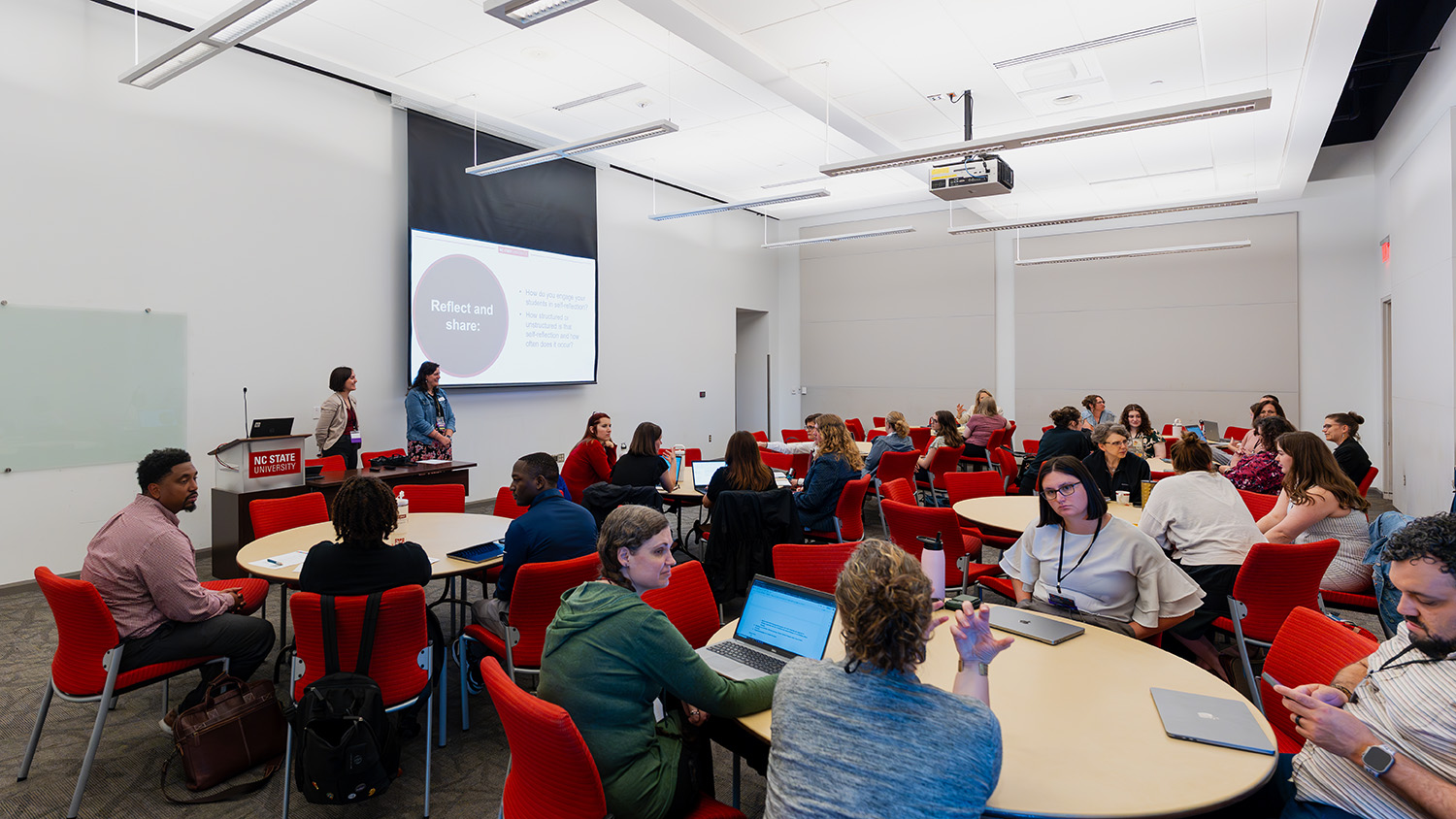Bayer Gift Grows a Garden
Honors garden lets students design their outdoor corner of campus
A group of students in the University Honors Program has gone green in a big way, bringing beauty to NC State’s campus, while also making a long term impact on the environment.

Students in the University Honors seminar Pollinator Gardening (HON 297) spent the spring semester researching native flowering plant species and planning the installation of a pollinator garden. The decline of honey bee populations, as well as native bee species, has a direct impact on American agriculture. Because pollination is essential for the production of fruits and vegetables, there is a critical need to protect native pollinator species and honey bees. Part of protecting pollinator species is providing food sources that are available throughout the spring, summer, and fall seasons. With financial support from the Bayer CropScience Bee Care Center, and led by Dr. Susan Carson (Associate Professor, Department of Plant and Microbial Biology and Director of the NC State Quality Enhancement Plan), students have created a space on campus that is not only visually stunning, but which will also support environmental health.
At the beginning of the semester, students were assigned to teams (Procurement, Design, Resource Guide, and Poster) and were directly involved in all stages of creating the garden.
Procurement Team
- Erin Bacon: Human Biology, Freshman
- Kendall Wiggins: Biomedical Engineering, Sophomore
Members of the procurement team collaborated with NC State Grounds Maintenance supervisor Dallas Bretzman. Bacon and Wiggins acquired all of the plants from local nurseries, endeavoring to include as many native plants as possible. The team’s biggest challenge was selecting plants that will thrive in the garden, while also adhering to the layout and color scheme envisioned by the design team.
“It’s cool to leave something lasting on campus. It makes the spot look nicer than it did before, and it also has a good ecological impact.”
Kendall Wiggins, Sophomore
Design Team
- Elizabeth Vicario: Civil Engineering, Freshman
- Bryce Abbott: Aerospace Engineering, Freshman
- Briana Campbell: Economics, Sophomore
 When designing the garden, purposeful planning of the layout was essential. Design team members gave consideration to which plants would need room to expand, or which would require greater exposure to sun. The layout was carefully designed in advance of breaking ground with team members sharing responsibility for creating technical drawings to illustrate their design plans. Team members were especially vigilant during the planting process to ensure that plants were placed in accordance with the final design, resulting in a space which is both functionally efficient and visually appealing.
When designing the garden, purposeful planning of the layout was essential. Design team members gave consideration to which plants would need room to expand, or which would require greater exposure to sun. The layout was carefully designed in advance of breaking ground with team members sharing responsibility for creating technical drawings to illustrate their design plans. Team members were especially vigilant during the planting process to ensure that plants were placed in accordance with the final design, resulting in a space which is both functionally efficient and visually appealing.
“This [HON 297] is so hands on; it’s not like any other class experience.”
Elizabeth Vicario, freshman
Resource Guide Team
- Logan Lineberry: Biochemistry, Sophomore
- Mitch Kessler: Biochemistry/Genetics, Sophomore
- Patrick Connor: Wildlife Conservation Biology, Sophomore
- Claudia Mesa: Statistics, Freshman
- Daniel Hueholt: Meteorology, Freshman
The planning and planting component of the project may be complete, but the garden will require maintenance in order to continue to thrive. The resource guide team put HON 297’s vision for the future of the garden on paper, creating a point of reference for those who will assume responsibility for the care of the garden. The resource guide developed by the students includes seasonally-specific renderings of the garden as well as information about the plants and their required care. The guide ensures that the garden will become a lasting fixture of the Honors Village, continuing to thrive for future students to enjoy.
Poster Team
- Logan Butler: Biochemistry, Senior
- Jeffrey Perkins: Electrical Engineering, Sophomore
- Matt Burroughs: Chemical Engineering, Freshman
- Alex Wall: Biology, Freshman
Funding for the pollinator garden was provided by Bayer CropScience. The class traveled to the Bayer CropScience campus and the poster team presented the poster they designed to illustrate HON 297’s  vision for the garden to Bayer executives, including principal scientist and entomologist Dick Rogers. Students also had the opportunity to tour Bayer’s own pollinator garden.
vision for the garden to Bayer executives, including principal scientist and entomologist Dick Rogers. Students also had the opportunity to tour Bayer’s own pollinator garden.
When asked about their experiences with the University Honors Program, most students said that they particularly enjoy the exposure to diverse experiences that is afforded to them as Honors students. Many also spoke about the sense of community that stems from participating.
“My whole rationale with picking Honors Seminars is to do something that I’m not used to doing and gives me a break from the classes that are more concerned with my major.”
Matt Burroughs, Freshman
- Categories:


